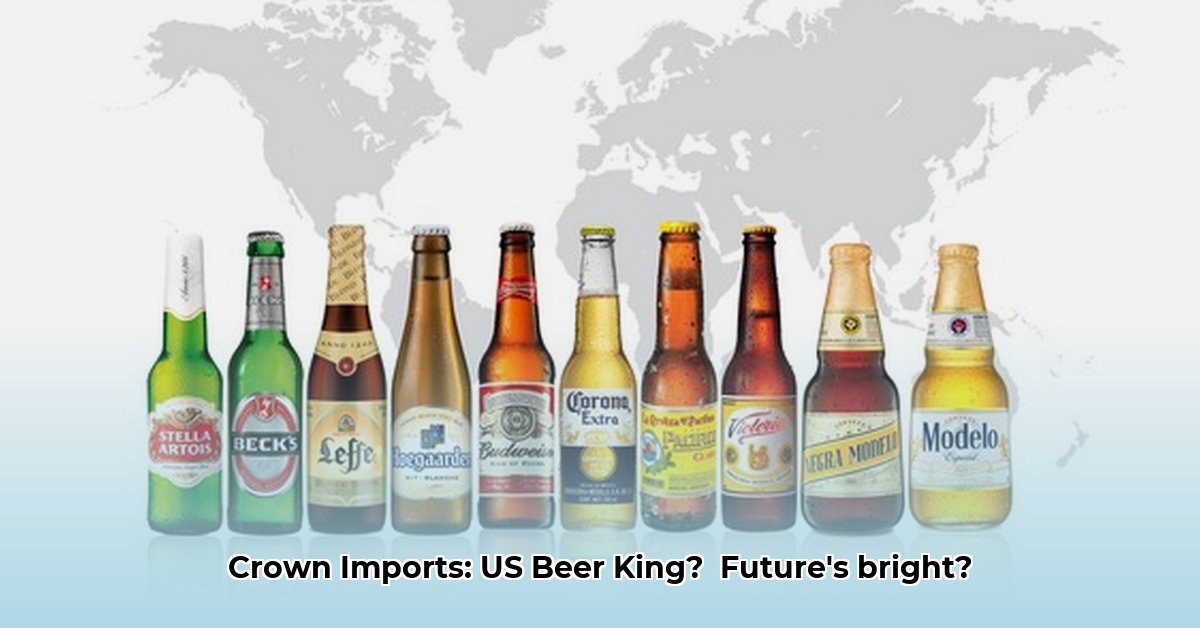
Crown Imports LLC, a subsidiary of Constellation Brands, holds a significant position within the competitive US imported beer market. Its success is largely attributed to the widespread popularity of brands like Corona Extra and Modelo Especial, which have achieved substantial brand recognition and market penetration. However, maintaining this dominance requires a strategic approach to navigate the evolving landscape of consumer preferences and intensifying competition.
Modelo's Market Share: A Foundation Under Pressure
Crown Imports benefits from exceptionally strong brand recognition for its flagship beers. These brands have become deeply ingrained in US culture, associating themselves with relaxation and social occasions. This, coupled with a highly efficient distribution network ensuring widespread availability, has formed the bedrock of the company's success. However, the dynamic nature of the beer market presents ongoing challenges. Consumer tastes are in constant flux, and maintaining market share requires continuous adaptation.
Navigating the Evolving Beer Market: Challenges and Opportunities
The imported beer market is characterized by its volatility. The popularity of specific styles and brands can shift rapidly, presenting both opportunities and challenges for established players like Crown Imports. The rise of craft breweries offering diverse and unique flavors, along with the growing appeal of premium imported beers, necessitates a strategic response. Crown Imports must proactively address these shifting consumer preferences to maintain its competitive edge. This involves more than simply increasing sales volume; it requires a comprehensive adaptation of strategy to meet the evolving dynamics of the market.
SWOT Analysis: Assessing Crown Imports' Position
A SWOT analysis reveals the key factors influencing Crown Imports' current standing and future potential:
Strengths: Strong brand recognition for Corona and Modelo; extensive and efficient distribution network; high consumer loyalty to established brands.
Weaknesses: Relatively narrow range of beer styles; vulnerability to shifts in consumer preferences away from lagers; increasing import costs and potential supply chain disruptions.
Opportunities: Expansion into craft beer or premium import segments; strategic partnerships to reach new customer bases; innovative marketing campaigns to build brand loyalty and introduce new products.
Threats: Intense competition from both established and emerging breweries; changing consumer preferences; potential government regulations and economic downturns that could impact profitability and market share.
Stakeholder Collaboration: A Shared Responsibility for Success
Crown Imports' success hinges on effective collaboration among various stakeholders. Their actions significantly influence the company's overall strategy and long-term success.
| Stakeholder | Short-Term Strategies | Long-Term Strategies |
|---|---|---|
| Constellation Brands | Enhance marketing for existing brands; Introduce limited-edition or seasonal beers. | Expand beer portfolio through acquisitions; Prioritize sustainability and ethical sourcing. |
| Retailers | Optimize shelf placement for top-sellers; Implement targeted promotional offers. | Adapt inventory to changing consumer demands; Integrate seamless online ordering systems. |
| Consumers | Demand for consistent product availability and effective marketing communication. | Desire for product variety, unique flavors, and sustainable practices. |
| Regulatory Bodies | Maintain full legal compliance with all relevant regulations. | Proactive engagement with regulatory agencies to anticipate and adapt to future changes. |
Risk Assessment and Mitigation Strategies
Crown Imports faces several key risk factors that could significantly impact its profitability and market share. Proactive risk mitigation is essential for sustained growth.
| Risk Factor | Likelihood | Impact | Mitigation Strategy |
|---|---|---|---|
| Shifting Consumer Tastes | Medium | High | Diversify beer offerings; Implement agile marketing strategies to respond quickly. |
| Increased Competition | High | Medium | Enhance brand loyalty programs; Explore new market segments and geographic areas. |
| Supply Chain Disruptions | Medium | High | Diversify suppliers; Enhance logistics and inventory management capabilities. |
| Regulatory Changes | Low | Medium | Maintain close communication with regulatory bodies; Ensure proactive compliance. |
| Economic Downturn | Low | High | Implement cost-cutting measures; Prioritize high-margin product lines. |
Crown Imports' Future: Adaptability as a Key to Success
Crown Imports' future hinges on its ability to adapt to the dynamic beer market. Maintaining its leading position requires a keen understanding of evolving consumer preferences and the proactive management of potential risks. The company's capacity for innovation and rapid adaptation will ultimately determine its continued success in the years to come. Ignoring these trends risks stagnation and loss of market share in a fiercely competitive landscape. The next few years will be critical in shaping Crown Imports' long-term trajectory.
Countering Competitive Pressures: A Strategic Roadmap
The US beer market exhibits a fluctuating volume, with imported and value brands experiencing relative resilience compared to overall market declines. Crown Imports, operating in a highly concentrated market, must execute a strategic plan to maintain competitiveness. Key elements include:
Niche Market Focus: Identify and cultivate specific consumer segments to establish a stronger brand identity and allow more focused marketing efforts.
Brand Building: Develop a compelling brand story that resonates with target consumers and justifies premium pricing while differentiating from competitors.
Supply Chain Optimization: Form strategic partnerships and establish robust logistics networks to ensure efficient and consistent product supply.
Strategic Alliances: Collaborate with distributors, retailers, or other breweries to expand market reach and access new customer segments.
Data-Driven Decision Making: Leverage market intelligence and data analytics to inform product development, pricing, and marketing strategies.
Agile Marketing Strategies: Implement dynamic marketing campaigns adapting quickly to shifts in consumer preferences and market trends, emphasizing digital channels and social media.
Source: CGA by NIQ Report